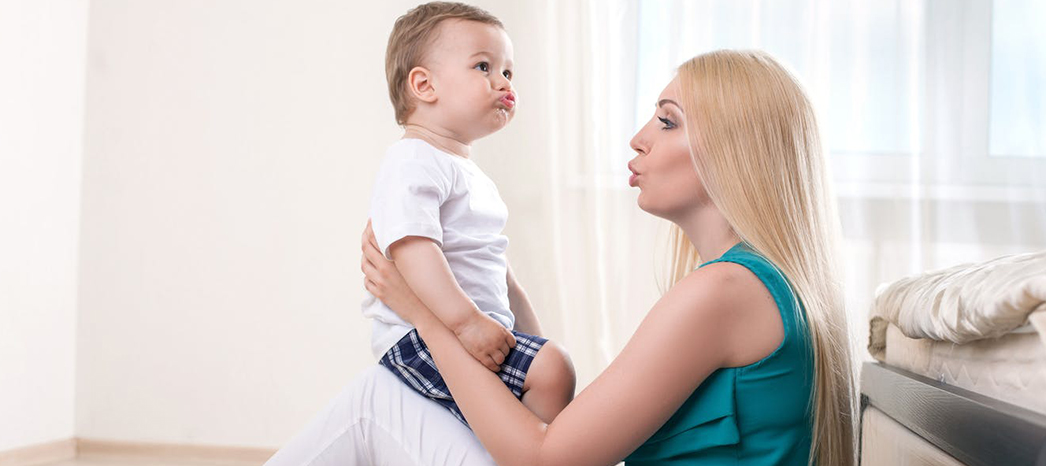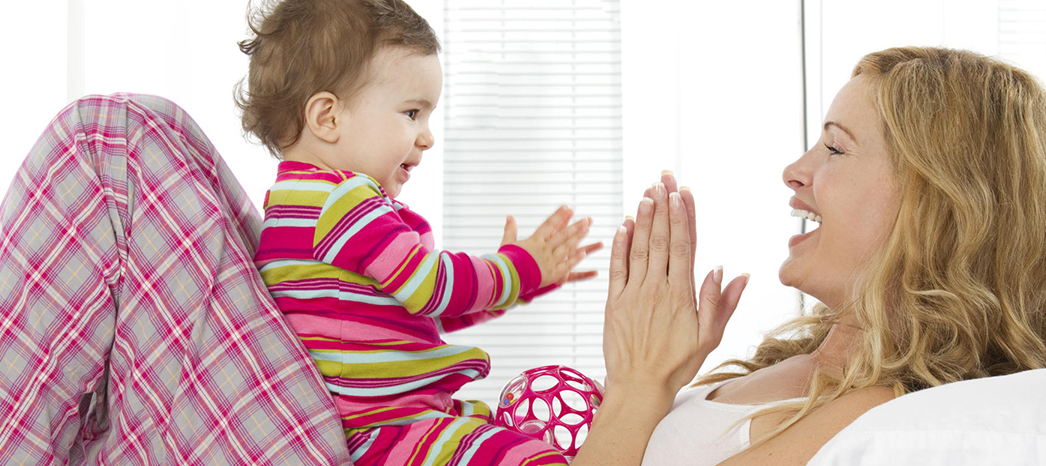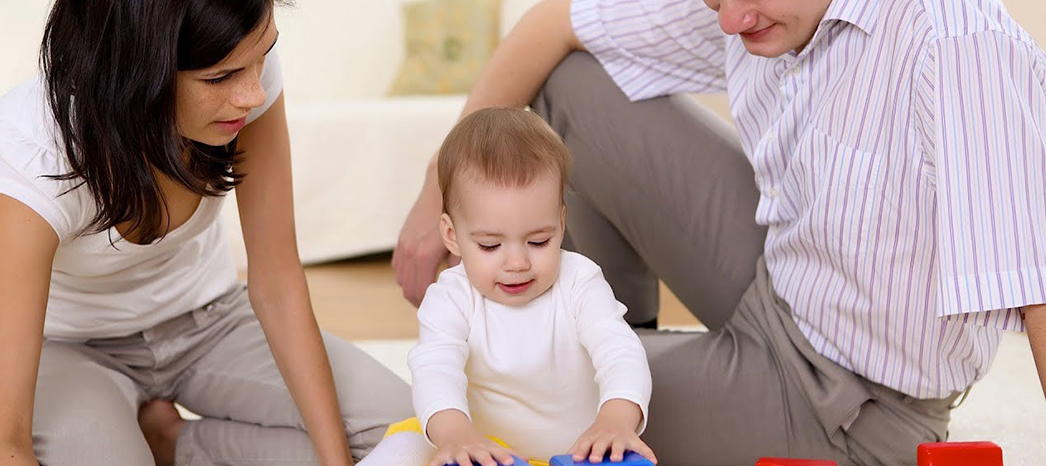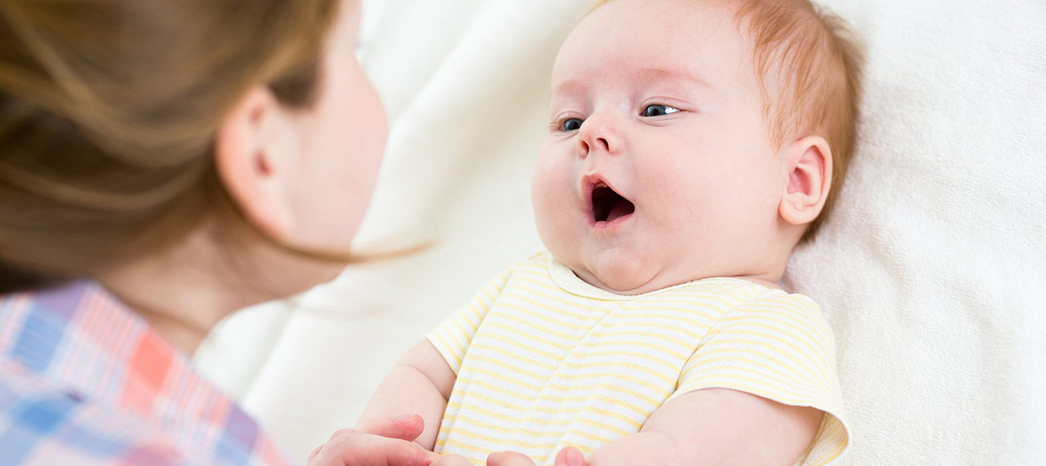Every parent is excited to hear the first words from their babies. Hearing your baby say 'mama' or 'dada' is an out of the world feeling. Although your baby will not be able to say these words clearly, the joy these will bring on your faces will be incomparable.
But with all this excitement comes added responsibilities. You might get concerned about your baby talking when you see others of his age group able to speak new words each day. Also, it might be a matter of concern for the parents if the baby is fumbling and lisping.
However, it has been noticed that support, environment, and proper education plays a significant role in determining the talking patterns of your baby.
Here we have compiled a fundamental process that your baby follows from babbling to talking.
When do Babies Begin to Talk?

A baby develops the art of talking during the first two years of his childhood. However, long before they actually start to talk, they observe the patterns and the language their parents and other adults around them use to communicate.
The first sounds from your baby might not be clear as they are made with lips, tongue, and spaces between the teeth. But gradually, these sounds turn into nicely formed words like baba, mama, and dada within a period of 6 months.
And, this is the time when your baby tends to pick new words from the surroundings, and till the age of 18 months or two years, they start to form simple sentences on their own.
How do Babies Learn to Talk?

Here is how you can expect your baby to learn the language. And, if you are bringing up your baby in a bilingual environment, he will learn both the languages at the same time and with much ease.
In Utero
It has been observed that the babies start to understand the language when he still unborn. Your unborn baby recognizes your voice among the others and gets used to the steady beat of your heart while in the utero.
Between Birth to Three Months
During this stage of your baby's growth, although they might not be able to react for the baby clothes, crying is the first form of communication used by them.
And to your surprise, the kind of voice they make while crying is different for different purposes. They usually produce a piercing scream when hungry and a whimpering cry when they need a diaper change.
However, as far as language is concerned, they start to recognize the sounds of various words and the formation of sentences around.
Between Four to Six Months
When your baby has turned six months, you will observe that they have started to respond to their names. Also, they start to make constant sounds like baba and Yaya. However, in this babbling process, mama and dada sounds can be heard quite often, but they are not the signs of your baby starting to talk.
Making these sounds by the babies and knowing their real meaning and relating it to you will happen with time, and it can take a year or so. This stage, between the four to six months, the baby will make many sounds that can be a mix and match of endless words stuck together.
Moreover, it does not matter what your native language is. The babbling sounds exactly the same in all the languages, be it Hindi, English, Spanish or Japanese.
Between Seven to Twelve Months
This is the stage where babblings start to make sense. They try and imitate the patterns followed by you and the tones that you use for communicating.
However, this stage needs attention, and here is when you can give direction to your baby's babbling by talking to them and also reading for them.
Between Thirteen to Eighteen Months
During this period, the child is aware of the meaning of the words used by them. Also, they can even try sound modulation and know how to gather attention when they need something, or they need to know something.
Finally, here is when your baby will know the importance of language for communicating their needs.
Between Nineteen to Twenty Four Months
Although your baby will not be able to say much, they start to understand almost everything that goes around. This is the time when they expand their vocabulary. Here, parents need to watch what they say; your child is observing everything, and that might come back to you, which is not appreciable.
After your child has turned two, it will be easy for him to create simple sentences and imitate smooth tunes. Also, this is the time when your baby will start to express his likes, dislikes, and various other feelings.
So, when you go out to shop for the kids wear with your baby after she has turned two, you can be sure of her giving her genuine choice with the colors and the patterns.
From Two to Three Years
During this stage, the talking patterns in the babies get completely developed. They began to say complicated sentences. However, they might not be able to find appropriate volumes to be used.
And when your baby finally turns three, they become sophisticated talkers. Also, they will start understanding your commands and will work and do things as per the instructions.
How can you Help your Baby in Perfect Speech?

However, parents are the first-hand mentors for the babies, but the entire learning process can be divided into three categories. These are talking, reading, and listening.
Let us know about these in details:

Talking
This does not mean that you need to talk to your baby like a chatterbox; after all, you never want your baby to turn out to be one. But, you can start a conversation with your baby whenever you are together.
You can explain to them different things, point out certain things, introduce them to different objects, and even sing songs for them. It is advisable not to babble when talking to your baby. He might catch the same accent that you will not appreciate in the future.
Reading
This is yet another way to introduce to your baby some new set of words in his vocabulary. This also helps them to put together sentences and know-how stories flow.
When your baby is just born, he is excited to hear you speak, but when he grows, he starts enjoying the stories and their characters.
Listening
When your child is trying to talk, he is a good listener first. You need to understand what he needs to convey and respond accordingly. Your baby will speak and initiate the conversation with you only when he is sure that you are listening to them.
Hearing your child when he speaks is delightful in its own way. You might sometimes get irritated with him chattering all the time, but when he narrates play-by-plays at the preschool, you will feel equally excited.
The only thing that you should consider is the choice of words and the tone that you use with your baby. After all, you are his role model, and you surely do not want your baby to use bad words.
Also, when your baby starts to explain his likes and dislikes, shopping with kids for kids, clothes become fun.
Your kid finds his best friend in you. Develop a bond that is incomparable for a lifetime relationship of happiness and fun.




